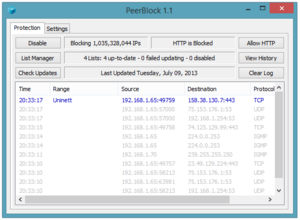Software:PeerBlock
 PeerBlock 1.1 on Windows 8.1 | |
| Developer(s) | Mark Bulas, "night_stalker_z", "XhmikosR" |
|---|---|
| Initial release | September 27, 2009 |
| Final release | 1.2[1]
/ January 14, 2014 |
| Repository | |
| Written in | C++ |
| Operating system | Microsoft Windows |
| Available in | English |
| Type | Firewall |
| License | GPL or zlib License |
| Website | peerblock |
| Part of a series on |
| File sharing |
|---|
 |
| Technologies |
| Video sharing sites |
| BitTorrent sites |
| Academic/scholarly |
| File sharing networks |
| P2P clients |
| Streaming programs |
| Anonymous file sharing |
| Development and societal aspects |
| By country or region |
| Comparisons |
PeerBlock is a free and open-source personal firewall that blocks packets coming from, or going to, a maintained list of black listed hosts.[2] PeerBlock is the Windows successor to the software PeerGuardian (which is currently maintained only for Linux).[3] It blocks incoming and outgoing connections to IP addresses that are included on blacklists (made available on the Internet), and to addresses specified by the user.[3] PeerBlock mainly uses blacklists provided by iblocklist.com.[4]
Development
PeerBlock 1.0 is based on the same code as PeerGuardian 2 RC1 Test3 Vista version.[3] It adds support for 32- and 64-bit Windows Vista, Windows 7, and Windows 8. When the PeerGuardian project ended, its developer Phoenix Labs encouraged current PeerGuardian users to migrate to PeerBlock.[5]
PeerBlock is under development by a small team of developers led by Mark Bulas.[6] Hosting, as well as the signed driver, is funded by donations from the public. Future donations are intended to contribute to future signed drivers, hosting and to possibly rent a virtual private server on which the team should be able to build a "real" online-update feature for future releases of PeerBlock.
Features
PeerBlock has added multiple features in the latest version of the program. Such as a constantly updating blocklist managed by the home site and a manager that lets you choose which lists to include in the block.[7] The program allows for a user to turn on and off both IP and HTTP trackers as well as including a log showing the time, source, IP address, destination, and protocol of the tracker. A list of settings allows users to both customize their program's interface as well as its operations.[citation needed][8]
Until September 2013, I-Blocklist, the supplier of the blocking lists PeerBlock uses, supported unlimited free list updating. Since September 2013 updates were limited to once weekly, except to paid subscribers. PeerBlock is hard-coded to use I-Blocklist lists and has entered into a revenue-sharing agreement with I-Blocklist.[9] In late 2015 blocklists were no longer available without payment of a subscription.[10]
References
- ↑ Peerblock, LLC. "PeerBlock 1.2 – Peerblock Site". http://www.peerblock.com/releases/public-releases/peerblock-1.2.0-r693.
- ↑ Harac, Ian (November 5, 2009). "PeerBlock Helps You Surf the Web in Secret" (in en). PCWorld. https://www.pcworld.com/article/181359/PeerBlock.html.
- ↑ 3.0 3.1 3.2 "What is PeerBlock's relationship with the old PeerGuardian program?". http://www.peerblock.com/docs/faq#peerblock_vs_pg2.
- ↑ Chen, Xi; Kai Lin; Biao Wang; Zhe Yang. "Active measurements on bittorrent and emule ecosystem over the internet". 2nd International Conference on Consumer Electronics, Communications and Networks.
- ↑ "Phoenix Labs – Powered by vBulletin". http://phoenixlabs.org/2009/09/30/peerblock-1-0-released/.
- ↑ Peerblock, LLC. "About Us – Peerblock Site". http://www.peerblock.com/aboutus.
- ↑ Min, Xinping, Qingzhong Li, Lei Liu, and Lizhen Cui. "A permissioned blockchain framework for supporting instant transaction and dynamic block size". IEEE Trustcom/BigDataSE/ISPA.
- ↑ "A Complete Guide To Firewall: How To Build A Secure Networking System". https://www.softwaretestinghelp.com/firewall-security/.
- ↑ Peerblock, LLC. "PeerBlock / IBlockList Partnership – Peerblock Site". http://www.peerblock.com/news/139.html.
- ↑ "List Update Error: Subscription required – Peerblock Site". http://www.peerblock.com/list-update-error-info/402?src=pbw.
External links
de:PeerGuardian#PeerBlock
 |

